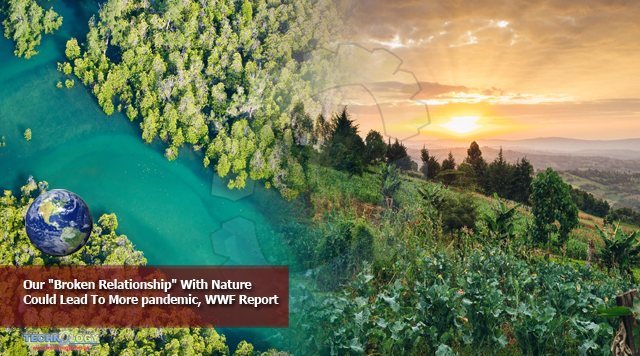In the new report, Covid-19 pandemic, Urgent Call To Protect People and Nature, the conservation NGO argues that wildlife exploitation and the planet’s unsustainable food systems have meant the risk of a new zoonotic disease emerging, caused by a pathogen that has leaped from a non-human animal to a human, is higher than ever before.

Most of the world’s major disease outbreaks in recent decades Covid-19, SARS, MERS, Ebola, Zika, Nipah, HIV, swine flu, bird flu, and so on have been zoonotic diseases that originated in a non-human animal. While it’s easy to imagine these diseases spontaneously jumped to an unfortunate human by sheer chance, our current relationship with the environment and wildlife greatly increases the number of opportunities a pathogen has to spread to humans. The report says that “new zoonotic diseases are emerging at an alarming rate” largely due to our exploitation of the environment and wildlife.
Much of the increased risk is associated with the planet’s current food system. Firstly, deforestation and large-scale conversion of land for agriculture are increasing interactions between wildlife, livestock, and humans. As just one of many examples, a study published in the journal Scientific Reports in 2017 found that extensive deforestation in West and Central Africa greatly increased contact between people and potential Ebola host species, like fruit bats and primates, leading to greater potential for viral spillover from hosts to humans. Secondly, global food trade and poor food safety standards mean there’s a high potential for exposure during sourcing, handling, and preparation practices.
Unless the world acts soon, the report argues the conditions are rife for yet another pandemic like Covid-19, the report suggests.
“We must urgently recognize the links between the destruction of nature and human health, or we will soon see the next pandemic,” Marco Lambertini, Director General of WWF International said in a statement. “There is no debate, and the science is clear; we must work with nature, not against it. Unsustainable exploitation of nature has become an enormous risk to us all. ”
To remedy the problem, the WWF report urges governments to commit to a “New Deal for Nature & People” to put nature on a path to recovery by 2030 “for the benefit of all people and the planet.” This involves numerous changes such as ceasing land conversion and deforestation for agriculture, as well as greater protections towards stopping illegal and unregulated wildlife trade. The report also calls for stimulus packages and public investments to help ease poverty and help local communities transition while protecting their livelihoods, rights, and culture.
Most of these changes, however, will rely on a fundamental systemic global change due to the deeply interconnected relationship between environmental issues, health crises, culture, and the global economy.
“The current crisis demonstrates that to make true progress on these issues, systemic change is required,” concludes the report.
“Cross-cutting responses are required, such as promoting more sustainable and efficient food systems, encouraging healthier and more sustainable diets, reducing overproduction and consumption, and moving towards nature-positive and climate-neutral financial systems that incorporate environmental risks in their decision-making processes.”
This news was originally published at iflscience.com